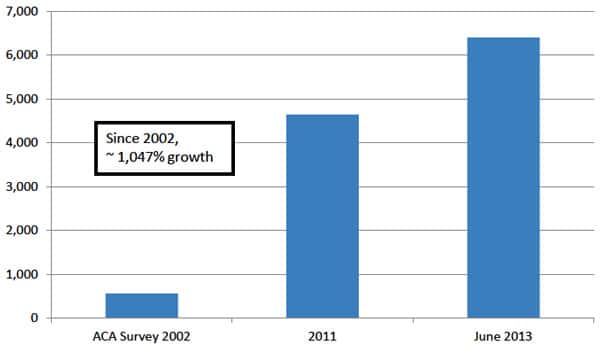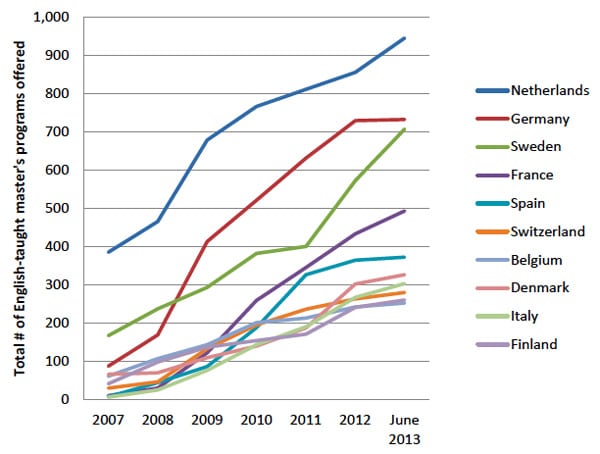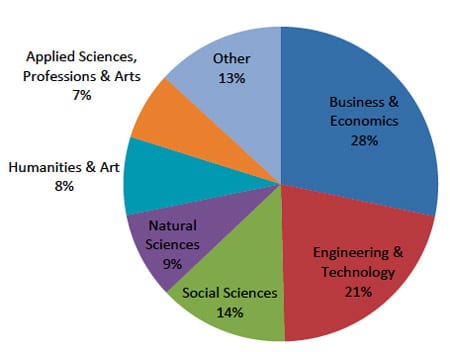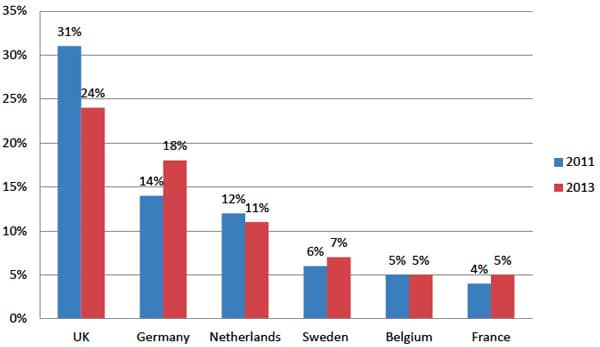Study finds more European universities offering graduate programmes in English
In less than two years, there has been a dramatic increase in the number of master’s programmes taught in English at universities in Europe. US-based Institute for International Education (IIE) recently released a report based on data from StudyPortals.eu, which showed that a total of 6,407 graduate programmes taught fully or partially in English were available as of June this year - representing a 37.4% increase over the 4,664 programmes available just 18 months earlier and accounting for nearly a third of all master’s programmes offered in Europe. The study’s authors attribute this growth to an interest among European institutions in meeting domestic demand for higher education in English, but also an expanded effort to attract students from around the world. They note as well a correlation between the prevalence of English-taught programmes across countries and such factors as whether or not institutions are allowed to charge differential tuitions for international students, government policies with respect to English-language instruction, institutional capacity to offer courses in English, and market demand. "With the increase of English-taught programmes, Europe's higher education is becoming more and more attractive for global talent," says Edwin van Rest, CEO of StudyPortals. "We notice that students from around the world are keen to study and live abroad in Europe. They want to get to know new cultures and languages, while having the opportunity to get an English-taught education." The report, English-Taught Master’s Programs in Europe: A 2013 Update, explains further:
“[The total number of programmes] can be broken down into courses taught entirely in English and partially in English, with the largest growth occurring in the former category. The number of master’s programmes taught entirely in English rose from 3,701 at the end of 2011 to 5,258 in June 2013, an increase of 42% occurring in the remarkably short span of one and a half years. Programmes taught partially in English increased from 963 to 1,149 over the same period, a 19% increase.”
The study updates an earlier IIE briefing from 2012 that first looked at English-taught master’s programmes in European countries where English is not the primary language. Both for 2012 and for this year’s count, the findings were based on programme listings available on StudyPortals, which claims to list roughly 90% of English-taught graduate programmes on the Continent.




“The traditional destinations to study in English, such as the US, the UK and Australia, are no longer a given,” he said. “Other countries are realising the benefits of attracting international students and, crucially, their governments are behind them, offering visas that include the chance of working afterwards.”
The IIE report concludes by noting some important questions that underpin the dramatic growth in English-taught programmes in Europe. Is there room for further growth still or, as appears to be the case in Germany, will the pace of new programme offerings begin to slow? And, as the study authors concede, the jury is still out as to how so many new programme offerings will be met by student demand: “Our data sources do not reveal how many students actually take part in each programme… Since so many programmes have been launched in such a short time period, it is difficult to know how many of them will be sustainable.” With additional courses taught in English comes greater responsibilities and implications that the use of English has for teachers and students, pedagogically and linguistically. Given the pace of English programme expansion in Europe, the world will be watching with interest as these questions resolve in the years ahead, just as the world’s major English-speaking destinations will no doubt continue to closely monitor the expansion of English-taught programmes in Europe and in other regions around the world. For further reading on this subject, we recommend:
Most Recent
-
The surging demand for skills training in a rapidly changing global economy Read More
-
US issues corrected student visa data showing growth for 2024 while current trends point to an enrolment decline for 2025/26 Read More
-
Survey finds US institutions expanding agency engagement and focusing on new student markets Read More


















